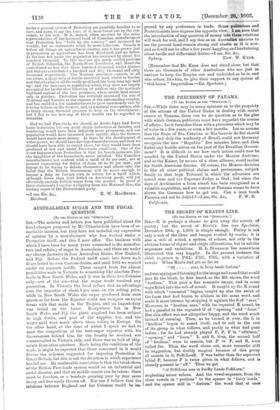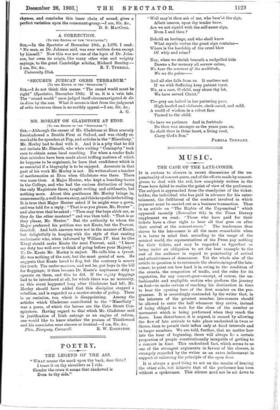THE SECRET OF KEATS'S LINE.
[To THE EDITOR OF THE " SPECTATOR."] Snt,—It is perhaps a shame to give away the secrets of poetry; but the secret of Keats's line (see Spectator, December 19th, p. 1,080) is simple enough. Poetry is not only a web of the ideas and images evoked by words ; it is also a web of sound, a system of echoes, not only in the obvious forms of rhyme and single alliterations, but in subtler sequences and variations. R. L. Stevenson has somewhere illustrated this very happily. In the present instance the chief sequence is PRL, FRL, FRL, with a variation of vowels. When Keats had got so far as "Of seas, in fa6ry lands forlorn,"
and was spying and listening for the image and sound that would just fit the blank, he first heard, as the MS. shows, the word "keelless." This gave a fine romantic image, and in some ways fitted into the web of sound. It caught up the K sound with which " casement " begins, caught up also the swish of the foam that had begun to sibilate in the same word, and made it more intense by stopping it against the S of " seas." Moreover, in "keelless seas," with its repeated E sound, he had a parallel to the repeated 0 of " opening " and " foam." But this effect was not altogether happy, and the word stuck instead of running. Then, as he turned it over, the L in " keelless" began to assert itself, and to call to the rest of its group in what follows, and partly in what had gone before ; for he had already played F, P, F in " of ttimes," " opening," and " foam." L and S, then, the second half of " keelless," were to remain, but P or F, and R, were called for. Then the word shone out, more romantic still in suggestion, but doubly magical because of this group of sounds in it, PeRiLonS. P was better than the aspirated labial F, because F is twice given in what follows, and is already present in " oF." Thus we get
" of PeRiLons seas in FaeRy Lands FoRLorn," neglecting minor echoes. And the vowel-sequence, from the close vowels in " perilous " to the opener in "wry lands," and the opener still in " forlorn." the word that at once
rhymes, and concludes this inner chain of sound, gives a perfect variation upon the consonant-group.—I am, Sir, &c., D. S. MacCom.







































 Previous page
Previous page